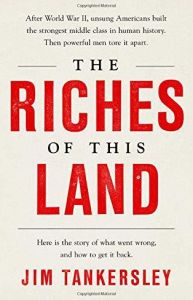Join getAbstract to access the summary!

Join getAbstract to access the summary!
Jim Tankersley
The Riches of This Land
The Untold, True Story of America's Middle Class
Public Affairs, 2020
What's inside?
Inequality is on the rise – and America’s middle class is shrinking.
Recommendation
In this intriguing reporter’s notebook on the US economy, Jim Tankersley tells the stories of struggling American workers while mixing in commentary from top economists and executives. Perhaps his most compelling point is that prosperity for marginalized workers means prosperity for everyone. From 1945 to 1978, the US economy was booming – and women and minorities contributed to that growth. But since then, economic opportunity across gender and racial lines has stalled, and the American middle class has gone into reverse. Tankersley’s job as a journalist grants him a front-row seat, and he adeptly diagnoses the rising inequality and shrinking prosperity that ails the US economy and American politics.
Summary
About the Author
Jim Tankersley is an economics reporter for The New York Times. He was previously policy and politics editor at Vox and before that, an economics reporter for The Washington Post.

















Comment on this summary